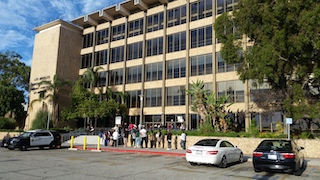Award Recipient
Top 100 Trial Attorneys in the United States
Contact Us for a Free ConsultationArticle 1, Section 28 of the California Constitution permits all persons who suffer losses because of criminal activity to seek and secure restitution from those convicted of crimes that cause the losses suffered. The person may then present evidence and arguments at a restitution hearing. People v. Smith (2011) 198 Cal.App.4th 415, 440.Summary in 45 Words or Less: Actually incurred expenses as a result of the criminal conduct are recoverable, in general, as well as future lost earnings and attorney fees as restitution in a criminal case. Pain and suffering in general is not recoverable, although there are very limited exceptions.
 Torrance Courthouse
Torrance Courthouse1. Medical Expenses and Counseling.
Penal Code § 1202.4(f)(3)(B)-(C) allows the recovery of medical expenses and counseling. The role of the judge in approving medical and counseling expenses is just to verify that the victim has a “factual and rational basis for the amount.” People v. Carbajal (1995) 10 Cal 4th 1114, 1125.
The judge is not supposed to evaluate which treatment is the most appropriate. For example, in People v. Keichler (2005) 129 Cal. App. 4th 1039, 1043 – 1046, two victims of an assault were Hmong, an ethnic sub group in Laos. The two victims sought restitution of $1,824.30 to cover the cost of a traditional Hmong spirit cleansing ceremony that involved the sacrifice of a pig, two cows and several chickens. The trial court ordered restitution as sought and the appellate court affirmed. Keichler, supra, at 1046. In other words, the court’s role is quite limited, just as long as the victim signs a declaration under oath as to out of pocket expenses actually incurred. Id.
Victims are also entitled to recover future medical expenses. People v. Phelps (1996) 41 Cal. App. 4th 946, 951.
2. Lost Wages, Past and Future.
Victims of conduct that is a crime, of which defendant was convicted, may recover lost wages that were a result. Penal Code § 1202.4 (f) (3) (E). This can cover “time spent as a witness or in assisting the police or prosecution.” People v. Ryan (1988) 203 Cal. App. 3d 189, 197. It can also be for the time attending court appearances. People v. Moore (2009) 177 Cal.App.4th 1229, 1231. Future lost earnings can also be recovered (People v. Millard (2009) 175 Cal.App.4th 7, 30), but this will necessarily require an accountant to calculate these and testify to his or her calculations in court.
3. Relocation Expenses.
Such expenses must be based on need, as verified by a mental health professional. Penal Code § 1202.4(f)(3)(l). People v. Mearns (2002) 97 Cal.App.4th 493, 501.
4. Identify Theft Costs.
Victims of identity theft may recover the costs of monitoring one’s credit report and the costs to repair one’s credit. Penal Code § 1202.4(f)(3)(L).
5. Attorney Fees.Please note that pain and suffering is not recoverable, except in very limited sex crime cases, i.e. Penal Code § 288; see Penal Code § 1202.4.
Penal Code § 1202.4(f)(3)(H) allows recovery by victims of their “actual and reasonable” attorney fees. In determining the amount of fees to be awarded, the judge is supposed to consider: (1) the hours spent by the attorneys; (2) the hourly rate of compensation; (3) the risk borne by the attorneys; (4) the quality of the attorney’s work. The “reasonable hourly attorney fee rate is that prevailing in the community for similar work.” PLCM Group v. Dexler (2000) 22 Cal.4th 1084, 1095.
The court will also consider the risk the attorney bears in not recovering. The greater the risk, the more generous a court should be in awarding fees.
Contact us.